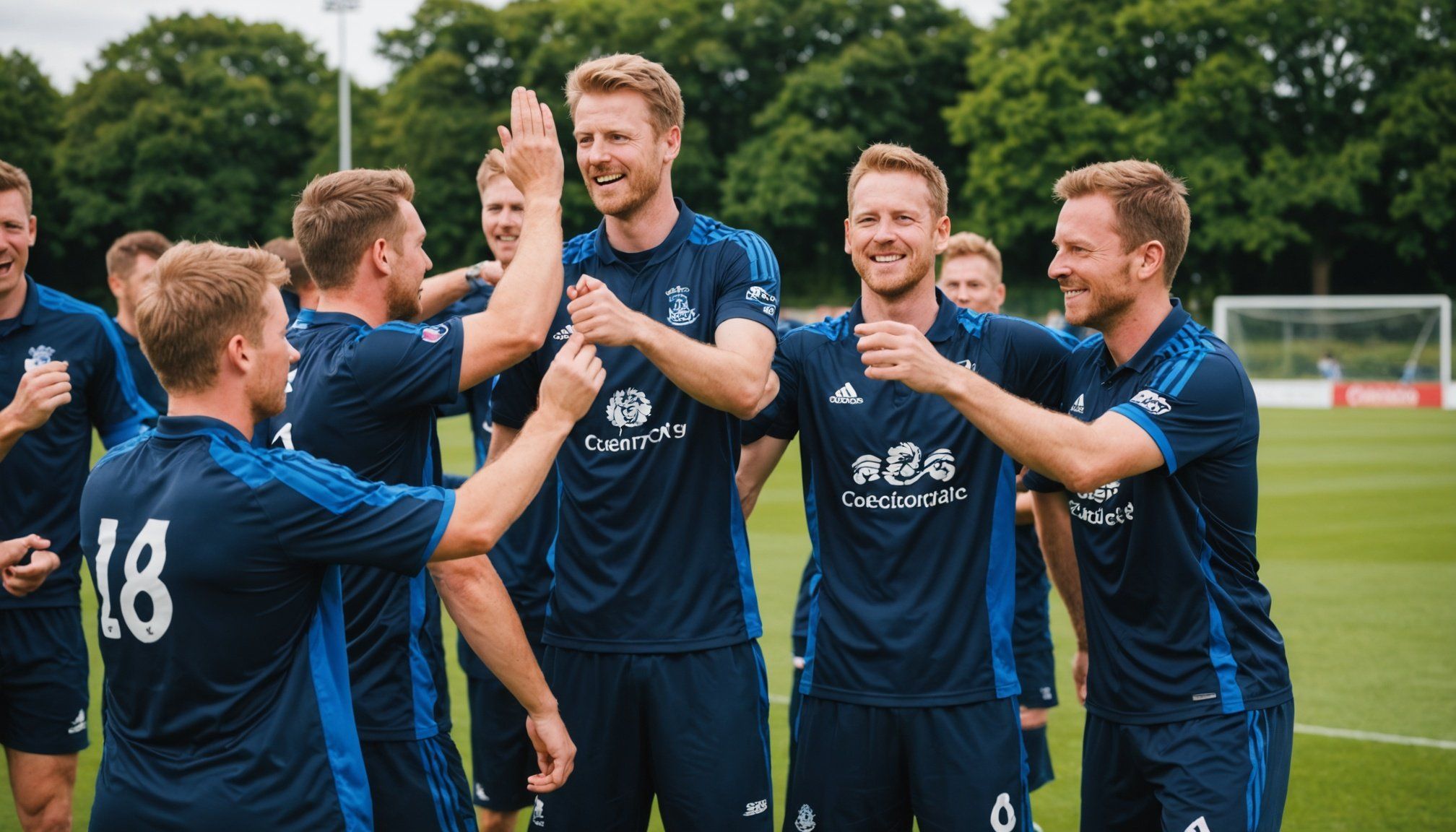Understanding the Importance of Team Culture in Sports
In sports, the importance of team culture cannot be overstated. It is the bedrock upon which successful teams are built, influencing sports team dynamics and having a profound impact on performance. Team culture can be defined as the shared values, beliefs, and behaviours that shape the environment and interactions within a sports team. It’s this underlying current that affects how players communicate, handle pressure, and maintain morale.
The connection between team culture and athletes’ performance is clear. A positive culture fosters trust and unity, enhancing individual and team performance. When athletes feel supported and valued, they are motivated to give their best both on and off the field. This environment reduces stress and increases the likelihood of achieving peak performance.
Also to discover : Enhancing athlete wellbeing: effective approaches for uk sports clubs to integrate mental health support into their programming
Case studies of successful teams often highlight the integral role of strong cultures. For instance, teams like the New Zealand All Blacks and the San Antonio Spurs attribute much of their success to fostering powerful, cohesive team cultures. These teams showcase how a well-established culture can lead to sustained success by promoting consistency, resilience, and adaptability. By embedding a strong culture, sports teams can significantly enhance their overall performance and fulfil their true potential.
Key Strategies for Building a Thriving Team Culture
Building a thriving team culture involves deploying strategic approaches that foster inclusivity and motivation. At the forefront, leadership plays a pivotal role in shaping culture by influencing team dynamics through their coaching style.
Also read : Elevating athlete commitment: creative approaches for uk sports clubs to strengthen member retention
Leadership’s Role in Cultivating Culture
-
Coaching Styles: The approach a coach takes can significantly impact how players interact with one another. Coaches who embrace supportive and inclusive coaching styles often cultivate environments ripe for cultural growth.
-
Trust and Respect: Developing trust and respect is crucial. Establishing these foundational elements unites teams and empowers athletes to collaborate efficiently.
-
Clear Communication: Leaders must employ transparent communication, fostering an atmosphere where team members feel heard and valued.
Engaging Team Members in Cultural Development
-
Decision-Making Involvement: Including athletes in decision-making processes ensures they feel investment in team objectives.
-
Shared Values and Goals: Crafting team values and goals together builds a cohesive direction and motivation.
-
Peer Mentorship: Encouraging mentorship cultivates a support network within teams, promoting growth and learning opportunities for all members.
Implementation of Inclusive Practices
- Fostering Diversity: Implementing strategies for diversity strengthens a team’s adaptability and resilience.
- Voice Representation: Ensuring all team members have a voice creates a rich, welcoming environment, enhancing overall team morale.
Practical Tips for Maintaining Team Spirit and Motivation
Sustaining team spirit is crucial, and motivation techniques play a significant role in achieving this. One effective approach is setting clear and achievable goals. These provide direction and purpose, encouraging athletes to strive towards their objectives. Importantly, goals should be tailored to each individual’s capabilities to ensure they are both challenging and attainable.
Celebrating small victories is another vital aspect. Recognising milestones, no matter how minor, boosts morale and reinforces positive behaviours. This emphasises progress and achievement, fostering a sense of accomplishment and unity within the team.
Incorporating sports psychology techniques can also significantly impact motivation. Techniques such as visualisation and positive self-talk help athletes focus and stay mentally resilient. These strategies enhance confidence and prepare team members for high-pressure situations.
Maintaining engagement involves creating a supportive atmosphere where athletes feel valued. Encouragement from both peers and coaches reduces anxiety and discouragement, contributing to a thriving team environment. It is essential to remember that motivation is not solely the responsibility of the coach; each team member plays a part in sustaining this vital element for enduring success.
Assessing and Improving Team Culture: Tools and Frameworks
Understanding and improving team culture involves structured assessments and frameworks. These help teams identify areas for enhancement and facilitate continuous improvement.
Conducting Team Culture Surveys
Regular team culture surveys provide valuable insights. When designing these surveys, focus on questions that gauge team sentiment effectively. Feedback mechanisms must be easy to use, allowing participants to express honest opinions. To ensure candid responses, guarantee anonymity, fostering an environment where team members feel safe sharing their thoughts.
Frameworks for Continuous Cultural Improvement
Implement frameworks that encourage ongoing cultural evolution. Regular team meetings play a critical role, offering platforms for open communication and examination of cultural health. Establish processes to follow up after feedback sessions, ensuring insights lead to actionable changes. Adaptability is key—plans for cultural evolution should remain flexible to accommodate shifting dynamics within the team.
Case Studies of Successful Cultural Transformations
Learning from case studies of other teams’ cultural shifts can be instructive. For instance, UK sports clubs have shown significant improvements through focused cultural transformations. These examples provide critical lessons and insights for teams looking to embed successful cultural changes. Key takeaways revolve around commitment to the process and tailored approaches to meet specific team needs.
Overcoming Common Challenges in Team Culture Development
Team culture challenges can pose significant barriers to achieving cohesion and success. Identifying typical obstacles is the first step towards fostering a resilient team environment. Often, these challenges include miscommunication, differing personal values, and lack of trust. Proactively addressing these issues is crucial for maintaining a harmonious team culture.
Conflict resolution plays a pivotal role in navigating team culture challenges. Effective strategies involve clear communication, active listening, and mediation when disagreements arise. Ensuring all voices are heard while facilitating constructive dialogue strengthens the team’s ability to resolve disputes amicably.
Building resilience is essential for handling cultural setbacks. Introducing mental resilience training and stress management techniques can empower team members to better cope with obstacles. This not only enhances individual well-being but also collectively fortifies team dynamics against future challenges.
Encouraging an open mindset enhances adaptability. Emphasising the importance of learning from setbacks and being open to change promotes a culture of continuous growth. Teams equipped with robust resilience are more likely to overcome setbacks, emerging stronger and more unified. Addressing these common challenges head-on fosters lasting, positive team culture capable of withstanding pressures and achieving success.
Expert Insights: Perspectives from Sports Professionals
Understanding team culture from the perspective of sports experts can provide unique insights. Engaging with professionals steeped in team culture consultation reveals best practices and emerging trends that can enhance team dynamics.
Interviews with Successful Coaches and Managers
Interviews with successful coaches reveal that a strong team culture emerges from consistent reinforcement of values and transparent communication. These leaders emphasise involving athletes in strategy discussions, thus cultivating ownership and accountability within teams. The coaches’ advice for new aspirants is centred around creating an environment where open dialogue thrives, and everyone’s contribution is valued.
Psychological Insights on Team Dynamics
Sports psychologists offer crucial insights into the psychological framework underpinning effective teams. They highlight the importance of recognising individual mental health needs while maintaining a collective team spirit. By promoting mental well-being, teams can address stressors preemptively, ensuring sustained resilience and enhanced performance.
Future Trends in Team Culture Development
Looking forward, future trends in team culture development include leveraging technology to facilitate communication and connectivity. As athlete demographics shift, ingredients for culture-building must adapt, becoming as inclusive and diverse as the teams they support. Embracing innovations in management strategies will keep teams competitive and culturally harmonious.
Expert Insights: Perspectives from Sports Professionals
Engaging with sports experts sheds light on the critical role of team culture in success. Insights from industry professionals offer profound knowledge on maintaining robust sports team dynamics. When asked how successful teams sustain their winning streak, many identify adherence to core values and consistent team culture consultation as essential factors. These consistently drive teams toward excellence, impacting their performance positively.
Interviews with Successful Coaches and Managers
In conversations with renowned coaches, one striking theme is their dedication to fostering transparent communication. Their experiences reveal that engaging players in dialogue enhances understanding and team unity. Furthermore, these leaders stress involving athletes in strategy discussions to cultivate ownership and responsibility. New coaches are advised to prioritise these practices to build a harmonious and efficient team environment.
Psychological Insights on Team Dynamics
Sports psychologists continually emphasise understanding the psychological framework of teams. Acknowledging individual mental health needs while fostering a collective spirit is crucial. This approach not only addresses potential stressors early but also bolsters the team’s resilience and mental well-being, integral for maintaining peak performance.
Future Trends in Team Culture Development
Emerging trends suggest leveraging technology to improve team interactions. As athlete demographics evolve, the significance of inclusive culture-building grows, ensuring diverse team needs are met effectively. Continued innovation in team management strategies will keep teams competitive and culturally cohesive.











